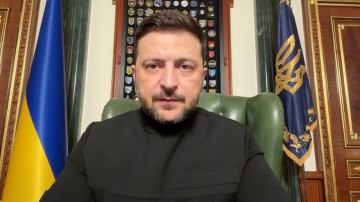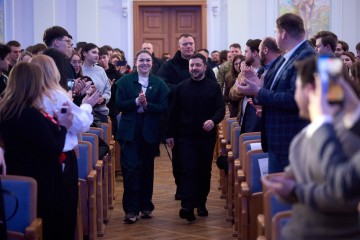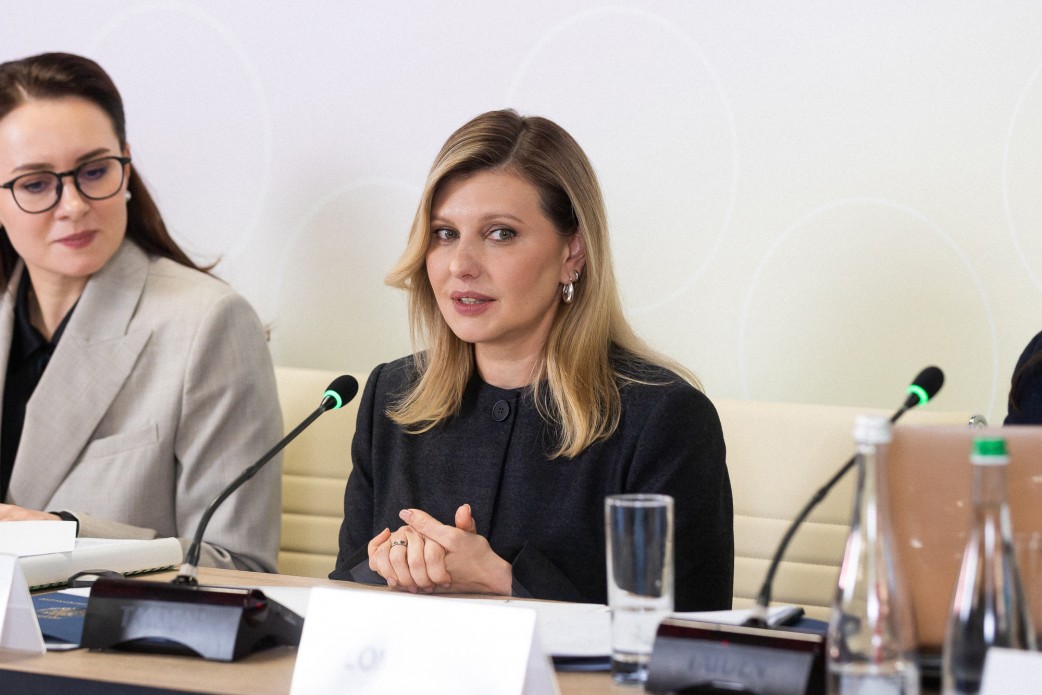First Lady of Ukraine Olena Zelenska took part in an off-site meeting of the Barrier-Free Council chaired by Prime Minister of Ukraine Yuliia Svyrydenko, which took place in Borodyanka.
 The meeting was also attended by representatives of the Government, heads of relevant committees of the Verkhovna Rada, Ambassadors, representatives of the UN system, the Council of Europe, the WHO, and other international organizations in Ukraine, Heads of Regional Military Administrations, representatives of local communities, and civil society.
The meeting was also attended by representatives of the Government, heads of relevant committees of the Verkhovna Rada, Ambassadors, representatives of the UN system, the Council of Europe, the WHO, and other international organizations in Ukraine, Heads of Regional Military Administrations, representatives of local communities, and civil society.
“Now, the moment has come when all our documents and projects must do the most important thing – come to life in real communities. In the places where people go to work, take their children to school, come to hospitals, stores, or for public services. This is how a person forms their daily impression of the state’s care and its work,” the First Lady emphasized.
Deputy Prime Minister for Restoration of Ukraine – Minister for Communities and Territories Development Oleksii Kuleba, and Deputy Minister of Culture Anastasia Bondar reported on the implementation of the Action Plan of the National Strategy and the communication campaign “Barrier-Free Means When You Can.”
According to them, results have been achieved this year in various areas.
 Emergency assistance: the 112 service is operating across all of Ukraine, with video calls and sign-language interpretation, SMS, e-call, subscriber location identification, and multilingual support introduced.
Emergency assistance: the 112 service is operating across all of Ukraine, with video calls and sign-language interpretation, SMS, e-call, subscriber location identification, and multilingual support introduced.
Rehabilitation: more than 314,000 patients have received rehabilitation services; a one-stop rehabilitation service is being rolled out in communities, along with targeted evacuation routes for severe injuries.
Prosthetics and assistive rehabilitation devices: more than 82,000 people have been provided with support; documentation has been simplified; access to prosthetics has been expanded for foreign servicemembers.
Labor market: over 8,500 microgrants have been issued to businesses, including around 1,300 to veterans. Nearly 13,000 internally displaced persons have been employed.
“Movement Without Barriers:” around 100 km of barrier-free routes are being built in 15 pilot communities, with 65 facilities already completed.
Veterans: more than 2,000 support specialists are in place, and over 430,000 support services have been provided. The Veteran PRO platform and the experimental project “Veteran Sports Development” have been launched, with more than 320,000 people taking part.
During the meeting, government officials also reported on flagship projects.
 The Ministry of Culture is implementing the initiative “Barrier-Free Culture.” A communication strategy has been developed, and the campaigns “Barrier-Free Means When You Can” and the “Barrier-Free Map” have been launched.
The Ministry of Culture is implementing the initiative “Barrier-Free Culture.” A communication strategy has been developed, and the campaigns “Barrier-Free Means When You Can” and the “Barrier-Free Map” have been launched.
The Ministry of Health is implementing the project “Development of the Rehabilitation Support System: Child Rehabilitation, Outpatient Departments and One-Stop Services in Communities.”
The Ministry of Economy has launched “Barrier-Free Access on the Labor Market.” Compensation options have been expanded for employers who provide workplaces adapted for persons with disabilities.
The Ministry of Defense is implementing the “Wounded Warrior Package.” More than 20,000 units of adaptive clothing have already been delivered, and five rehabilitation hospitals are being modernized under NATO’s Renovator project.
The Ministry of Social Policy, Family and Unity is working on the projects “Improving the Provision System for Assistive Rehabilitation Devices,” “Early Intervention,” and “Supported Living,” and is preparing the project “Active Longevity.”
 The Ministry of Digital Transformation is implementing “Barrier-Free Administrative Service Centers.” A draft law “On Digital Accessibility” has been developed, and barrier-free monitoring and staff training for Administrative Service Centers have been carried out.
The Ministry of Digital Transformation is implementing “Barrier-Free Administrative Service Centers.” A draft law “On Digital Accessibility” has been developed, and barrier-free monitoring and staff training for Administrative Service Centers have been carried out.
“When we all acknowledge that barrier-free access concerns each of us, that a ‘person with special needs’ is not someone distant or unknown, but in fact every one of us at different stages of life or even within a single day, only then will we be able to create not a formal, but a genuine barrier-free environment. That is why the slogan of our information campaign is ‘Barrier-Free Means When You Can,’ because we are creating opportunities for everyone,” Olena Zelenska concluded.




